Aerosol Science Research Center signs MOU with University of Toronto
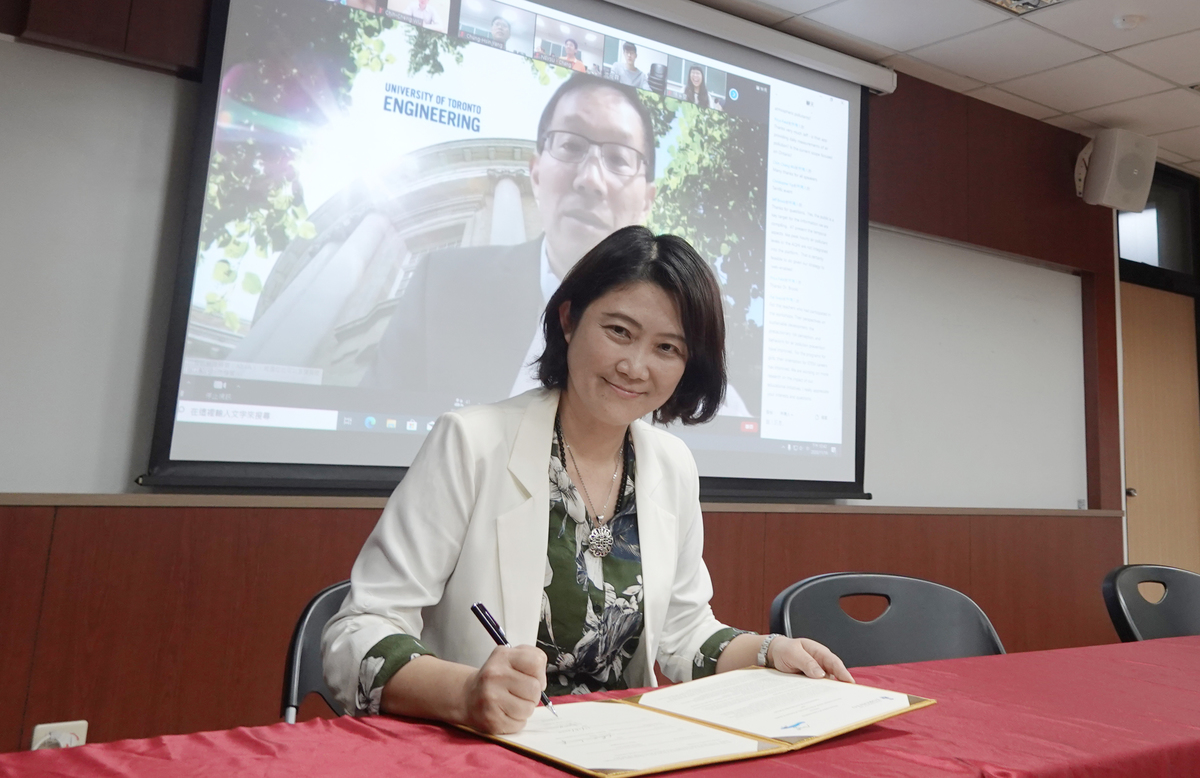
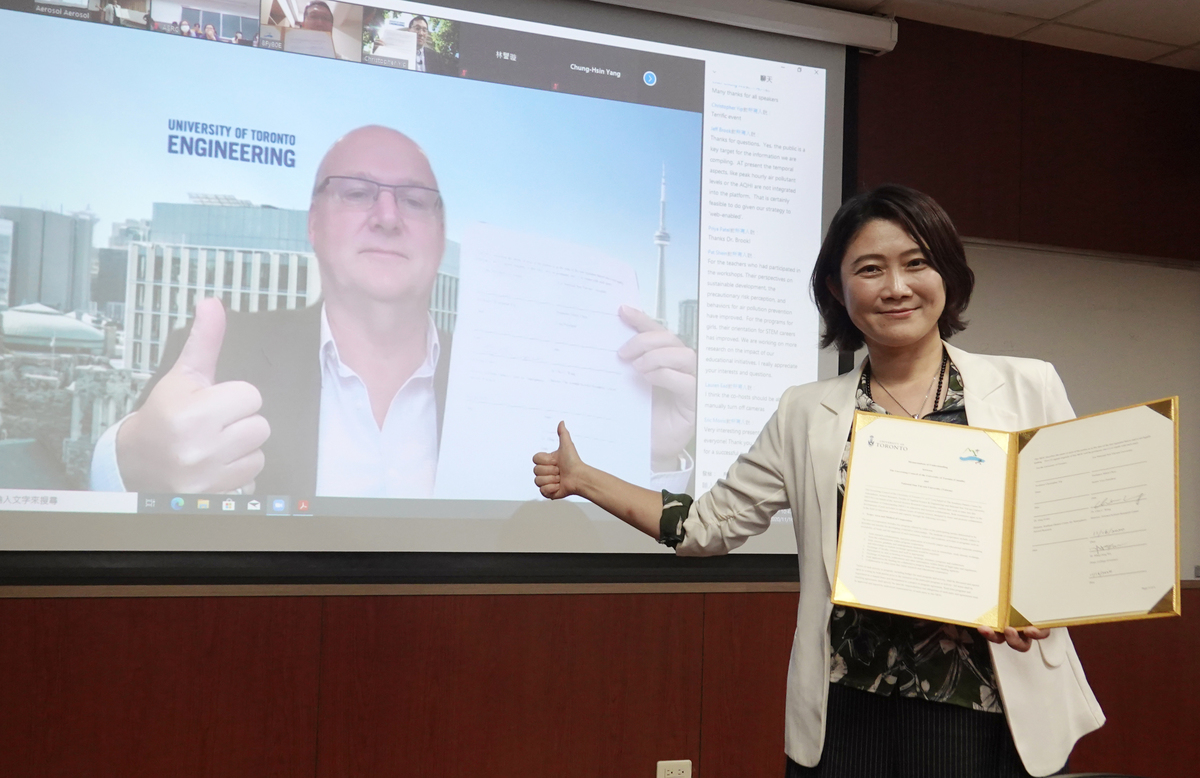
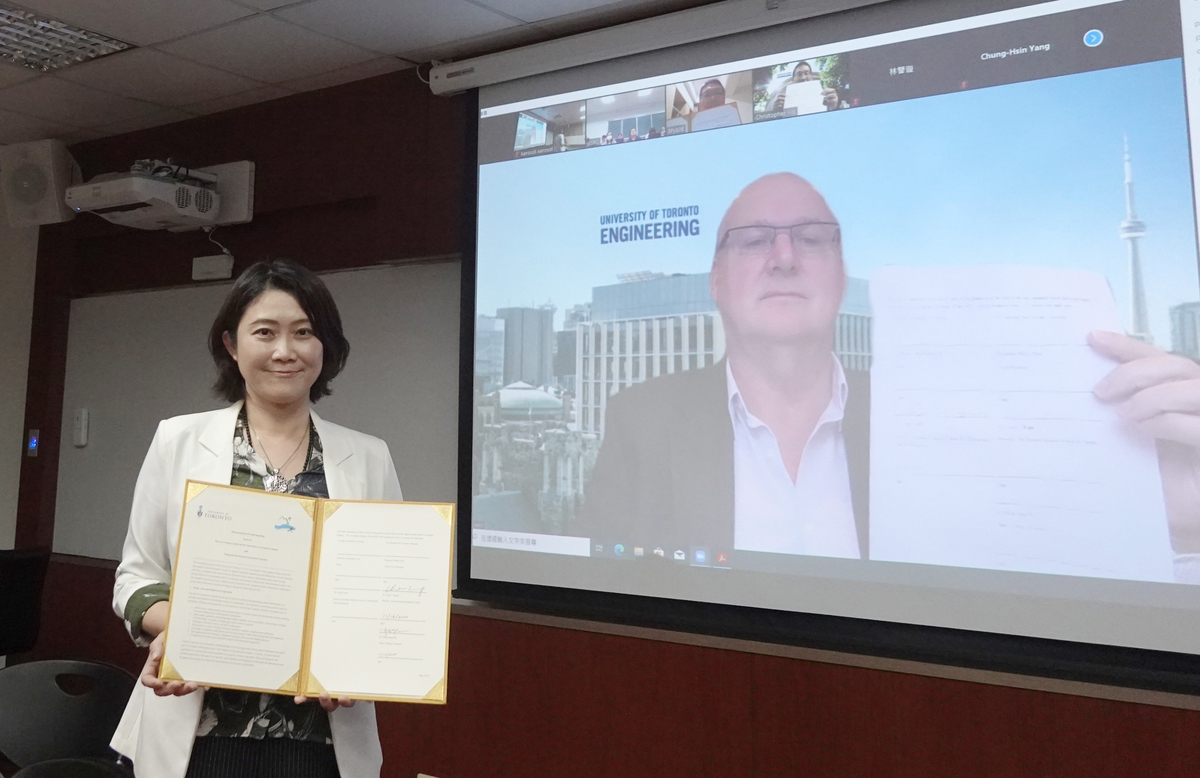

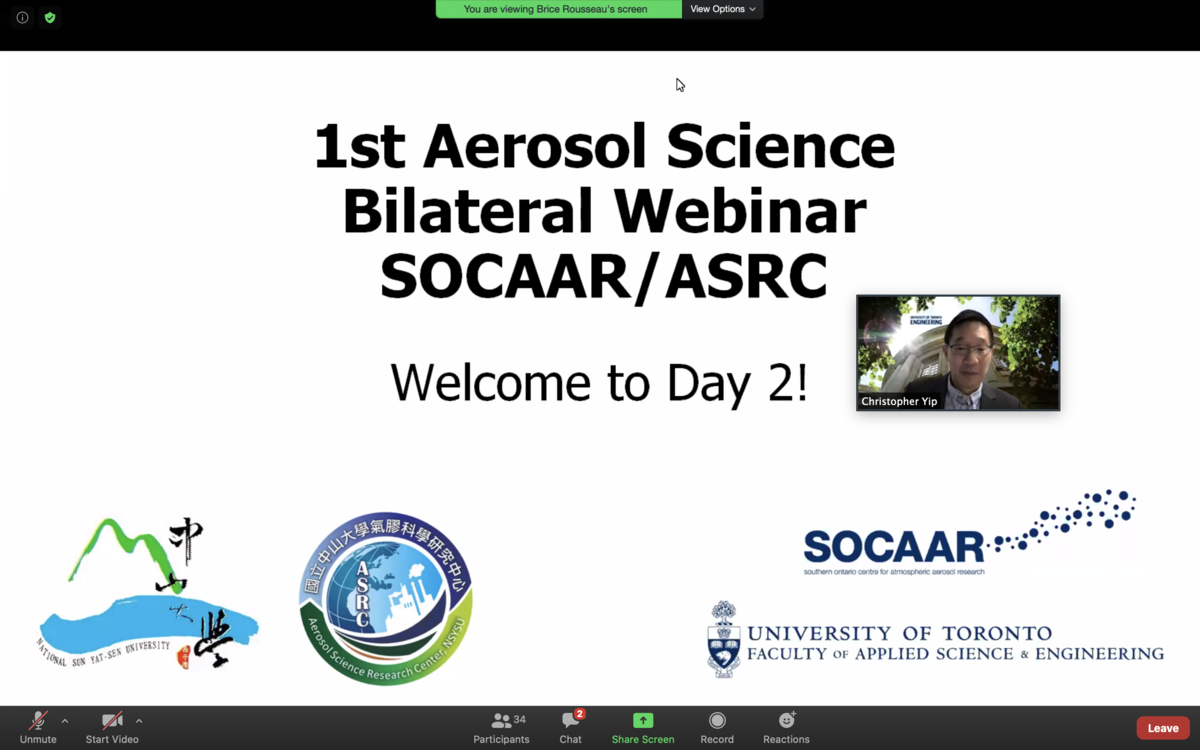
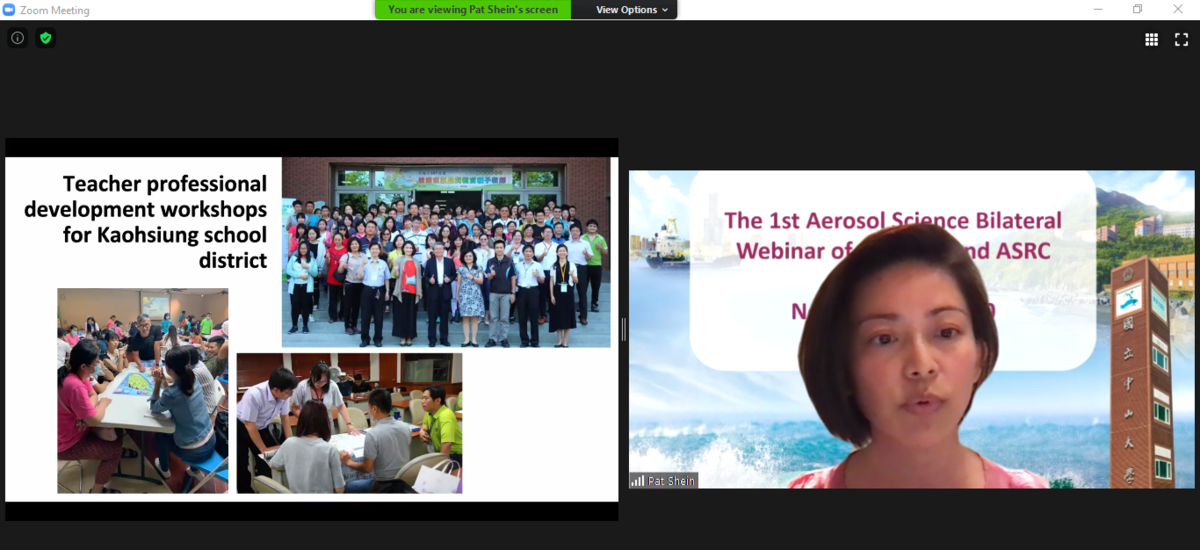

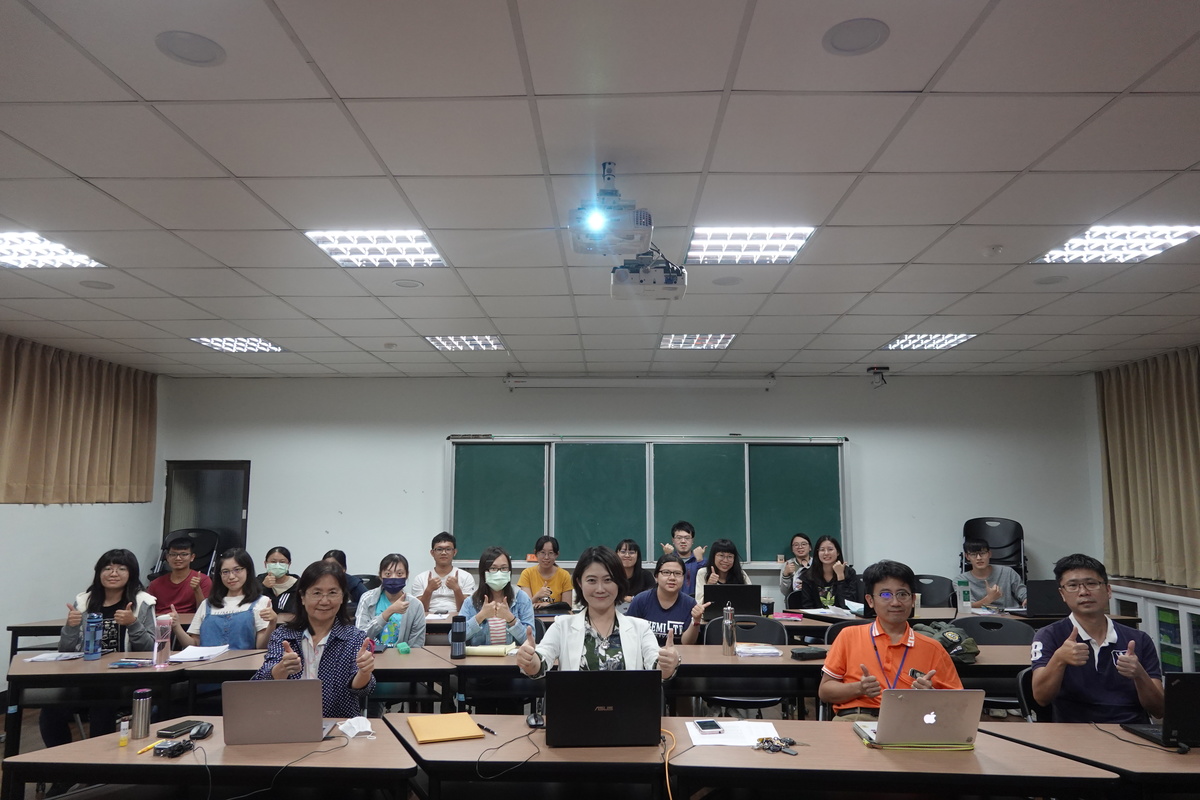
NSYSU Aerosol Science Research Center (ASRC) signed MOU with the University of Toronto in Canada to fight together against the COVID-19 pandemic. ASRC organized a bilateral video conference with the University of Toronto and signed an MOU on future cooperation in atmospheric aerosol chemistry and its impact on climate change, indoor air quality, sources of PM pollution and their control, biotoxicity and health risks of man-made aerosols, development of advanced aerosol instrumentation and environmental education in aerosol science to safeguard global air quality and people’s health.
Director of ASRC Chia C. Wang with NSYSU Senior Vice President Mitch Chou, Dean of NSYSU College of Science Ming-Jung Wu, and Director of the Science and Technology Division of the Taipei Economic and Cultural Office in Canada Dr. Peter C. Pan as witnesses, signed an MOU with The Southern Ontario Centre for Atmospheric Aerosol Research (SOCAAR) of the University of Toronto, Canada. SOCAAR is a world-class center committed to producing a broad, trans-disciplinary and actionable understanding of the origins, characteristics, environmental impact, and human health consequences of atmospheric aerosol.
Since the outbreak of the COVID-19 pandemic, Director Wang has been investigating the mechanisms of airborne virus transmission via bioaerosols and the related prevention strategies and published a perspective article in Science, a top international journal. The article, published in May 2020, has attracted the attention of people and over 250 media stations across the globe, including CNN, NBC, New York Post, Fox News, Forbes, and Physician’s Weekly; its full text was downloaded over 1.5 million times. The article led the WHO and the Centers for Disease Control and Prevention in the USA to review their recommendations for epidemic prevention by including suggestions on the prevention of the airborne transmission of virus-laden aerosols. Director Wang’s article had a great contribution to the international influence and visibility of Taiwan’s aerosol science research.
Aerosol Science Research Center at NSYSU is the first and only aerosol-themed center in Asia. Established in 2016, ASRC has been committed to research in aerosol science, including the influence of aerosols on the atmosphere, the marine environment, and climate change, different sources of PM 2.5 pollution and emission reduction strategies, health impact and pathogenesis of PM 2.5, PM 2.5-preventive medicine, and aerosol biomedicine research. Director Wang said that the ASRC has succeeded in developing and collecting advanced aerosol sensors unique in Taiwan and even in the whole of Asia, such as VUV Aerosol Photoelectron Spectroscopy, Time-Resolved Fourier Transform Infrared Spectrometer, Raman optical tweezers, and lidar remote sensing device, proving the global competitiveness and status of international leader of the Center.
Besides delineating development directions of advanced aerosol science, ASRC has recently been sparing no efforts in promoting environmental education in aerosol science, not only establishing a comprehensive program in aerosol science and two micro-courses at the University but also reaching out to all levels of the obligatory education system as well as citizens in Taiwan to offer aerosol science education. This year, the Center organized workshops on air quality for teachers of primary and junior high schools, the first aerosol science camp for female high school students, as well as collaborated with restaurants around the campus to promote plastic-free dining project and help create a sustainable environment, and by introducing the knowledge in the language of popular science, let the citizens understand the impact of tiny aerosols in the air on the environment, climate, and human health. While expanding its international influence, ASRC actively engages in local actions to fulfill the University's social responsibility and support the public character of higher education in line with the United Nations’ Sustainable Development Goals.
The ASRC emphasized that it has been continually strengthening its bilateral international collaborations: before signing an MOU on collaboration with The Southern Ontario Centre for Atmospheric Aerosol Research of the University of Toronto – the only aerosol research center in Canada, it signed an MOU on collaboration with the only aerosol research center in the USA in 2019. In the future, the ASRC will be further integrating international cross-disciplinary research in the most important issues of aerosol science and strive to become the hub for aerosol science research in Asia and closely collaborate internationally to safeguard the global air quality and people’s health.
Director of ASRC Chia C. Wang with NSYSU Senior Vice President Mitch Chou, Dean of NSYSU College of Science Ming-Jung Wu, and Director of the Science and Technology Division of the Taipei Economic and Cultural Office in Canada Dr. Peter C. Pan as witnesses, signed an MOU with The Southern Ontario Centre for Atmospheric Aerosol Research (SOCAAR) of the University of Toronto, Canada. SOCAAR is a world-class center committed to producing a broad, trans-disciplinary and actionable understanding of the origins, characteristics, environmental impact, and human health consequences of atmospheric aerosol.
Since the outbreak of the COVID-19 pandemic, Director Wang has been investigating the mechanisms of airborne virus transmission via bioaerosols and the related prevention strategies and published a perspective article in Science, a top international journal. The article, published in May 2020, has attracted the attention of people and over 250 media stations across the globe, including CNN, NBC, New York Post, Fox News, Forbes, and Physician’s Weekly; its full text was downloaded over 1.5 million times. The article led the WHO and the Centers for Disease Control and Prevention in the USA to review their recommendations for epidemic prevention by including suggestions on the prevention of the airborne transmission of virus-laden aerosols. Director Wang’s article had a great contribution to the international influence and visibility of Taiwan’s aerosol science research.
Aerosol Science Research Center at NSYSU is the first and only aerosol-themed center in Asia. Established in 2016, ASRC has been committed to research in aerosol science, including the influence of aerosols on the atmosphere, the marine environment, and climate change, different sources of PM 2.5 pollution and emission reduction strategies, health impact and pathogenesis of PM 2.5, PM 2.5-preventive medicine, and aerosol biomedicine research. Director Wang said that the ASRC has succeeded in developing and collecting advanced aerosol sensors unique in Taiwan and even in the whole of Asia, such as VUV Aerosol Photoelectron Spectroscopy, Time-Resolved Fourier Transform Infrared Spectrometer, Raman optical tweezers, and lidar remote sensing device, proving the global competitiveness and status of international leader of the Center.
Besides delineating development directions of advanced aerosol science, ASRC has recently been sparing no efforts in promoting environmental education in aerosol science, not only establishing a comprehensive program in aerosol science and two micro-courses at the University but also reaching out to all levels of the obligatory education system as well as citizens in Taiwan to offer aerosol science education. This year, the Center organized workshops on air quality for teachers of primary and junior high schools, the first aerosol science camp for female high school students, as well as collaborated with restaurants around the campus to promote plastic-free dining project and help create a sustainable environment, and by introducing the knowledge in the language of popular science, let the citizens understand the impact of tiny aerosols in the air on the environment, climate, and human health. While expanding its international influence, ASRC actively engages in local actions to fulfill the University's social responsibility and support the public character of higher education in line with the United Nations’ Sustainable Development Goals.
The ASRC emphasized that it has been continually strengthening its bilateral international collaborations: before signing an MOU on collaboration with The Southern Ontario Centre for Atmospheric Aerosol Research of the University of Toronto – the only aerosol research center in Canada, it signed an MOU on collaboration with the only aerosol research center in the USA in 2019. In the future, the ASRC will be further integrating international cross-disciplinary research in the most important issues of aerosol science and strive to become the hub for aerosol science research in Asia and closely collaborate internationally to safeguard the global air quality and people’s health.
Click Num:
Share
